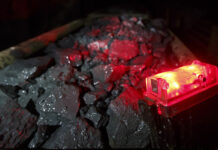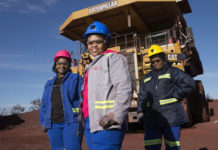
[miningmx.com] — JUST how seriously should the market take the spate of calls from the allies of South Africa’s ruling party that the mining industry be nationalised?
Gwede Mantashe, the African National Congress secretary-general, told Reuters on Thursday nationalising mineral assets was not on the party’s agenda. That’s all good and well.
The day after he said that though the Congress of South African Trade Unions, the militant labour federation that incorporates the bulk of the country’s unions, reiterated the call made by Julius Malema, the head of the ANC’s youth wing, that mines be nationalised.
It’s an unsettling development if you bear in mind that South African president Jacob Zuma and his clique in the ruling party rose to power with the strong support of these two organisations. Both organisations were thanked with seats in cabinet and have the ear of the most powerful people in the country.
Don’t forget either that Mantashe cut his teeth in the unions, rising to prominence in the National Union of Mineworkers, the country’s largest union.
Is the ruling party floating an idea and seeing how the markets react? Or is it just rhetoric from Malema, who hasn’t grabbed headlines recently for inflammatory comments, and Cosatu? Time will tell.
One thing is certain though, their comments cannot come at a worse time.
Commodity prices have fallen strongly, costs of inputs like electricity and labour are rising faster than inflation in South Africa, and the government is reviewing requirements of black ownership of mining companies.
In a global market already deeply spooked by the economic meltdown and with investment dollars hard to come by if there’s a perception of risk, this is not the way to grow South Africa’s mining sector which is in its fourth year of recession.
If there is one thing mining companies hate it’s uncertainty. They are investing millions if not billions of dollars into long-term projects and they need to know those investments are safe. Without that certainty, the chances of fresh mining investments by serious players are slim.
A leaked government draft of the mining charter on empowerment in 2002, proposing half of mining companies’ equity should be held in black hands, spooked the market and caused a stampede of R54bn out of mining stocks.
The precipitous decline in mining shares was eventually soothed by an agreement between the state and private sector that 26% of equity should be held by black South Africans by 2014, with the process to be reviewed after five years, which is where the industry finds itself now.
Some economists point to the government’s dismal track record in its own departments — home affairs and health as examples — of the inability of the state to manage. State-owned South African Airways is also held up as an example of how not to run a business. It has sucked up billions of rands in bailouts.
“In Zambia for example, the mines were nationalised and mismanaged and have never recovered. Even now that the private sector has been invited back in, it’s very slow going to get these mines to anything like they were,” said Chris Hart, an economist at Investment Solutions.
Malema was quoted in the Sowetan newspaper as saying: “At this moment, when imperialist forces are accepting the failure of capitalism, we should ask whether the time has not arrived for the government to make sure that the state owns the mines and other means of production as called for in the freedom charter.”
What is the wording in the freedom charter the ANC adopted in 1956?
“The national wealth of our country, the heritage of South Africans, shall be restored to the people; the mineral wealth beneath the soil, the Banks and monopoly industry shall be transferred to the ownership of the people as a whole; all other industry and trade shall be controlled to assist the wellbeing of the people,” it said.
One of the first acts of the new black government voted into power for the first time in 1994 was to vest all mineral rights in the state. There is no more private ownership of mineral rights by mining companies.
The government, and by extension, the people own the mineral wealth of the country and are allowing companies to mine it on their behalf, extracting taxes and, from next year, royalties for the privilege.
What foreign investors need to hear now is a clear and unequivocal message from the government what its views on nationalisation are. Granted Mantashe has told a couple of media groups nationalisation is not on the cards, but the message needs to be more formal, a response from the government to this talk of nationalisation.
If Zuma stood up in parliament and gave the mining companies his commitment to keeping the mining industry in private hands and knock down this talk of nationalisation on a public platform that should afford the sector a great deal of comfort in these uncertain times.











